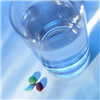
As the NHI deficit is increasing, the NHIA resorts to drug price cut to reduce cost. Low NHI drug payment prices have already driven many original manufacturers to withdraw their products from the market in Taiwan, leaving the market to domestic generic manufacturers. However, the Taiwan Health Reform Foundation (THRF) pointed out that though generic drugs are claimed to have the same ingredients as the original version, the differences in excipients may cause allergic or adverse reaction.
Wang Chun-Yu, President of the Taiwan Society of Health-System Pharmacists, said: “If a bottle of 500ml intravenous drip is cheaper than a bottle of mineral water, then why shan’t we all just sell mineral water?”
The NHI’s ruthless drug price cut has shown its impact on the supply of original drugs. Many international manufacturers have already walked out from Taiwan. Wang Chun-Yu said: “No drug companies would continue their business if there is no profit. For those who would, you may wonder about the quality of their products.”
NHI drug price cuts have a direct impact on patients. Wang Chun-Yu said: “Some hospitals may change suppliers if original manufacturers discontinue the supply. Changing suppliers may result in better profits for hospitals. For example, if one tablet is NT$1 cheaper, then a monthly prescription of 100,000 tablets will give a hospital NT$100,000 extra a month.”
Generic drugs refer to those whose ingredients are identical to those of the original drug and licensed after the original drug’s patent expires. According to the data from the Development Center for Biotechnology, from 2008 to 2013, generic drugs had an annual compound growth rate of 9%, higher than the 5% overall growth rate of the drug market.
Chu Hsien-Kuang, a Section Chief of the THRF, said: “Apart from the active ingredients, there are other substances in a drug, such as excipients. Experiences from other countries showed that some patients switching their usual medicine to generics had developed allergic or adverse reactions.”
Furthermore, contract-manufacturing may also entail potential risk. According to global statistics, the market value of contract-manufacturing grew from US$17.4 in 2008 to US$34.3 in 2013. The US had the biggest share of 57%, followed by the Europe 23% and Asia 10%.
Wang Chuan-Yu said: “Personally, I don’t think imported generic drugs are superior to those manufactured domestically. It is easier to inspect the manufacturing sites in Taiwan. For foreign manufacturers, the inspection is less straightforward, hence posing a risk.”
The NHIA now gives the same NHI payment prices to drugs identical in ingredients and quality. This is the reason behind the boom of generic drugs. Chu Hsien-Kuang said: “Most generic drugs are now subject to BA/BE tests; but, the question is whether their raw materials are also subject to long-term monitoring and inspection?”
The THRF keeps raising questions concerning medication safety. However, the healthcare system is a closely linked system. The authority is facing a big challenge to keep every aspect and every stakeholder balanced.
【2014-09-12/ TVBS】



